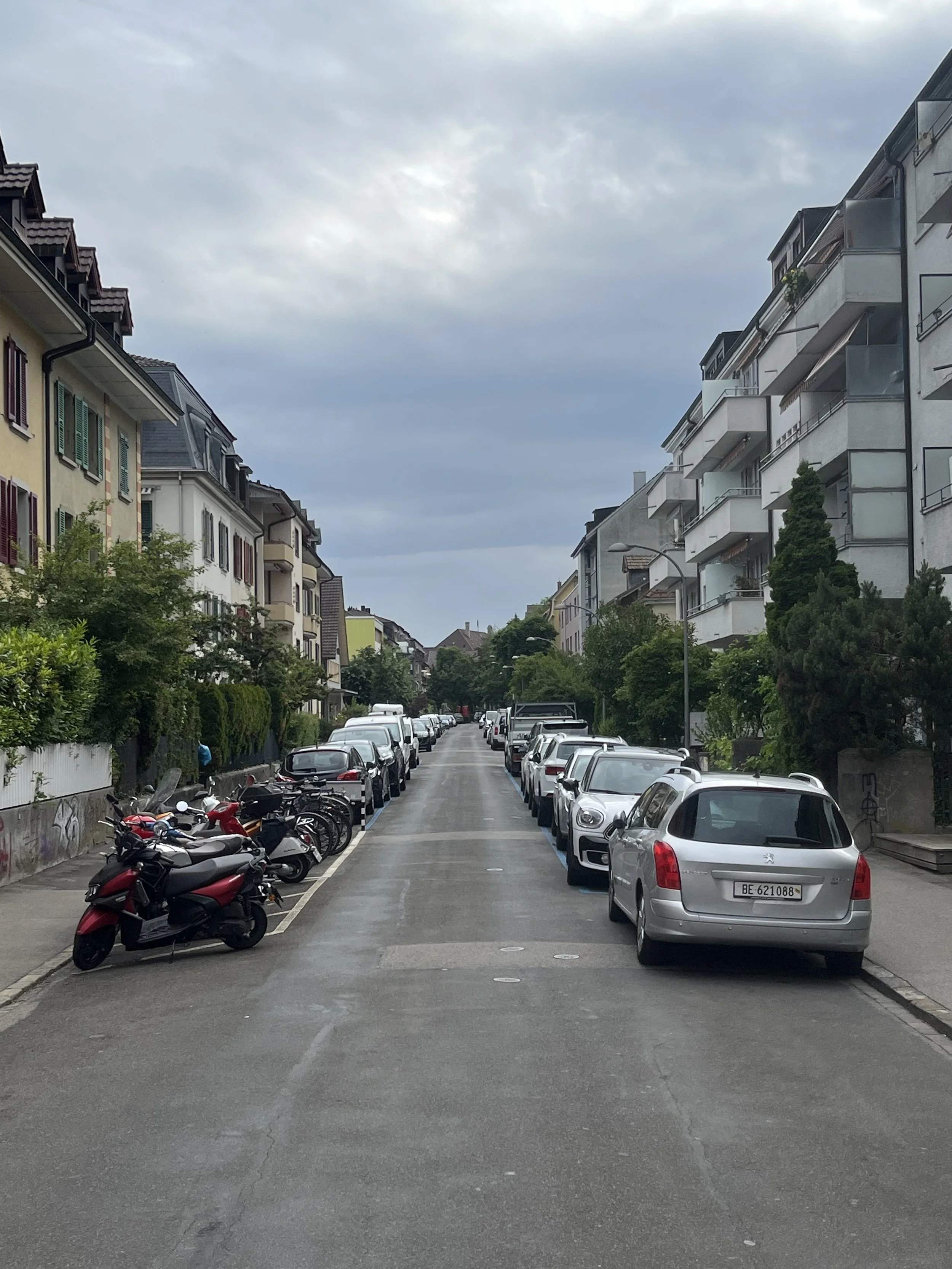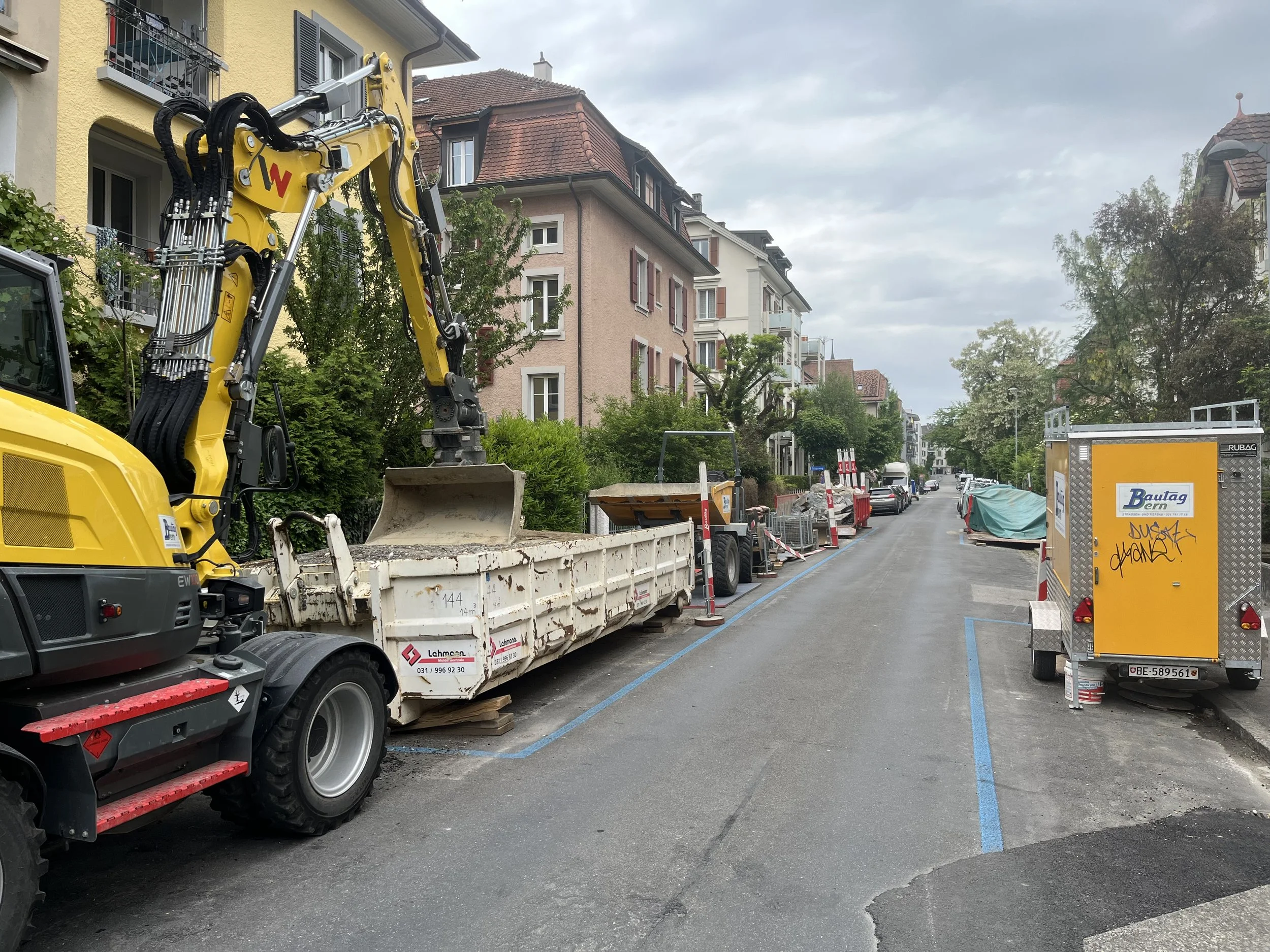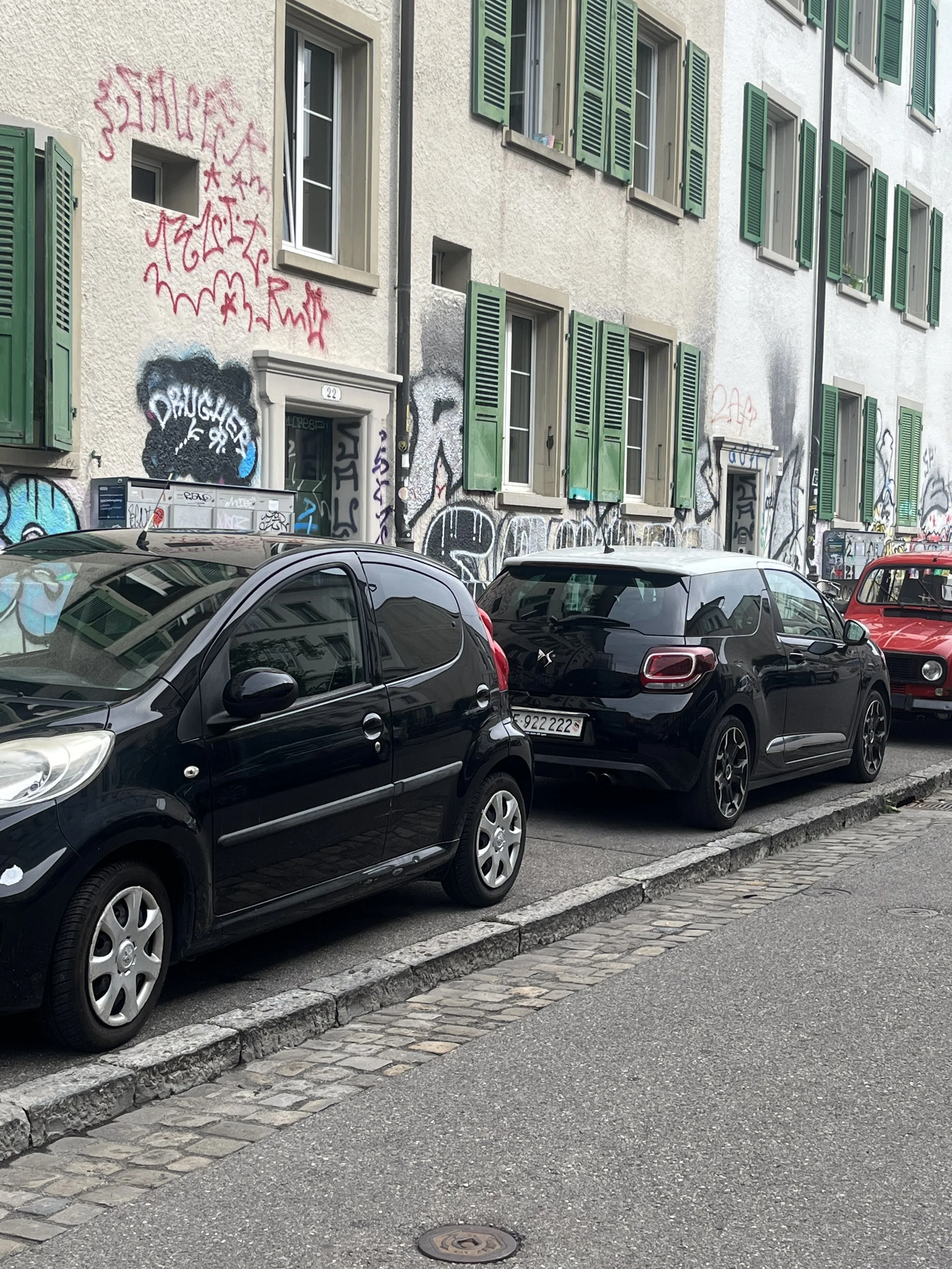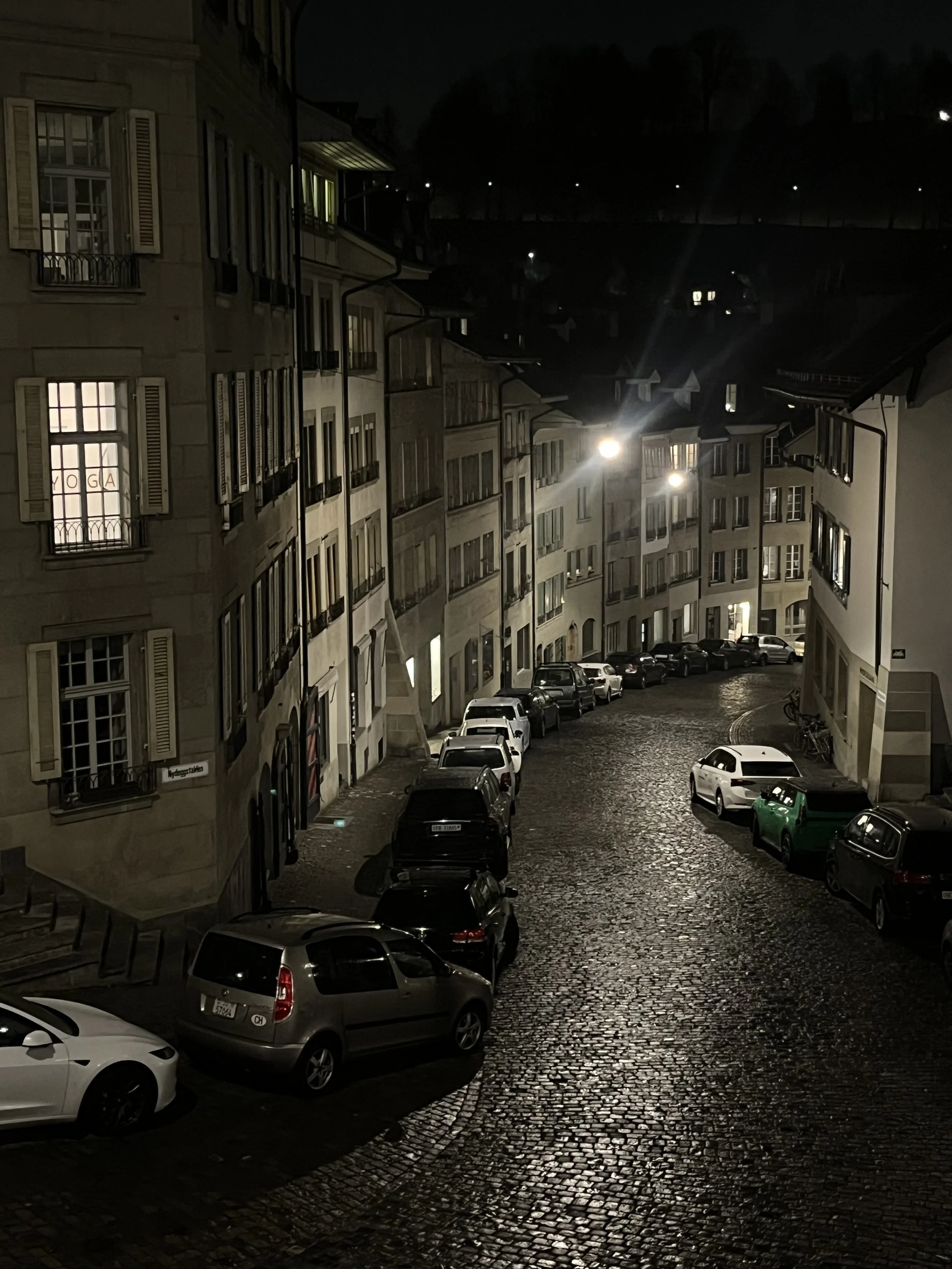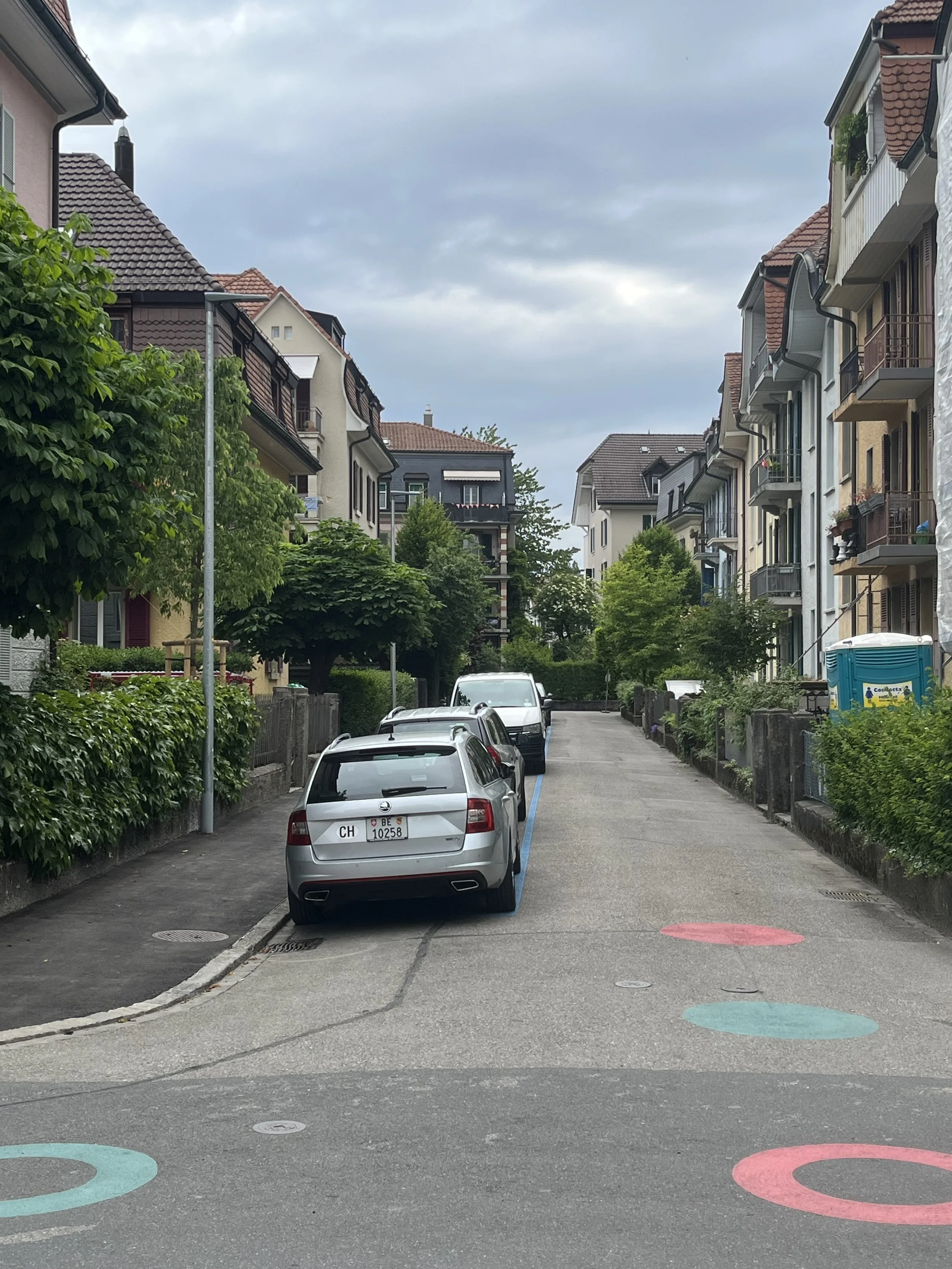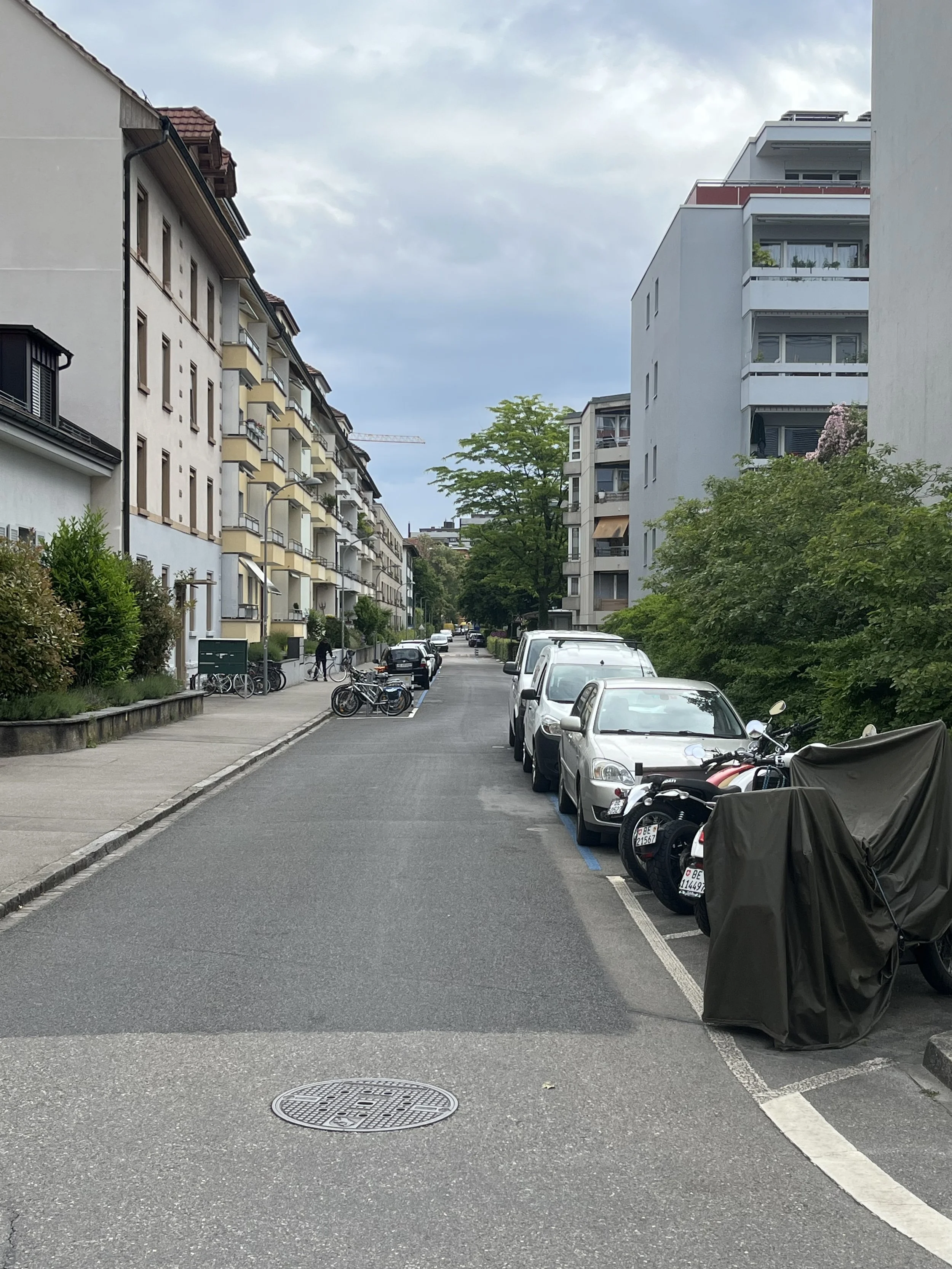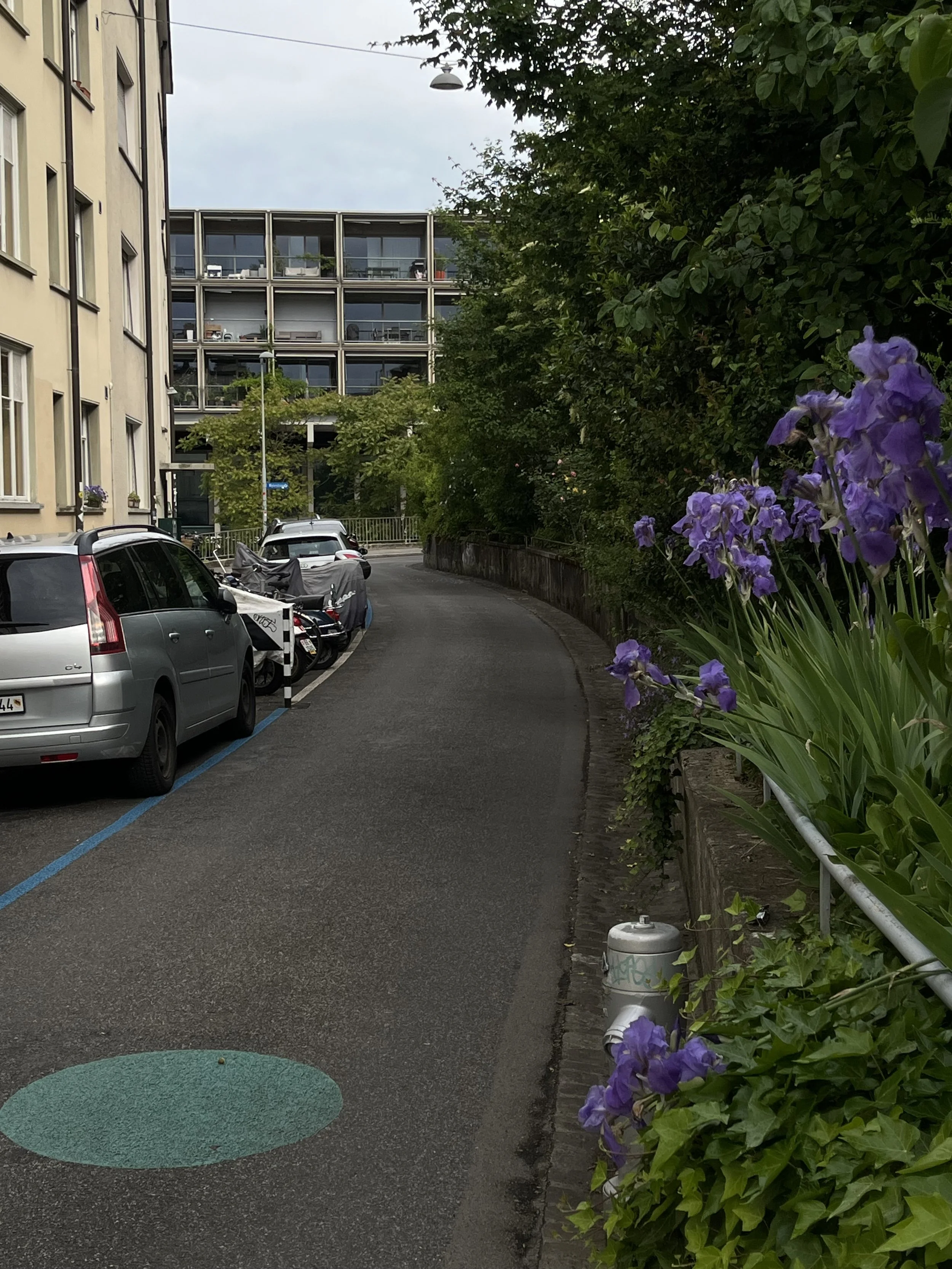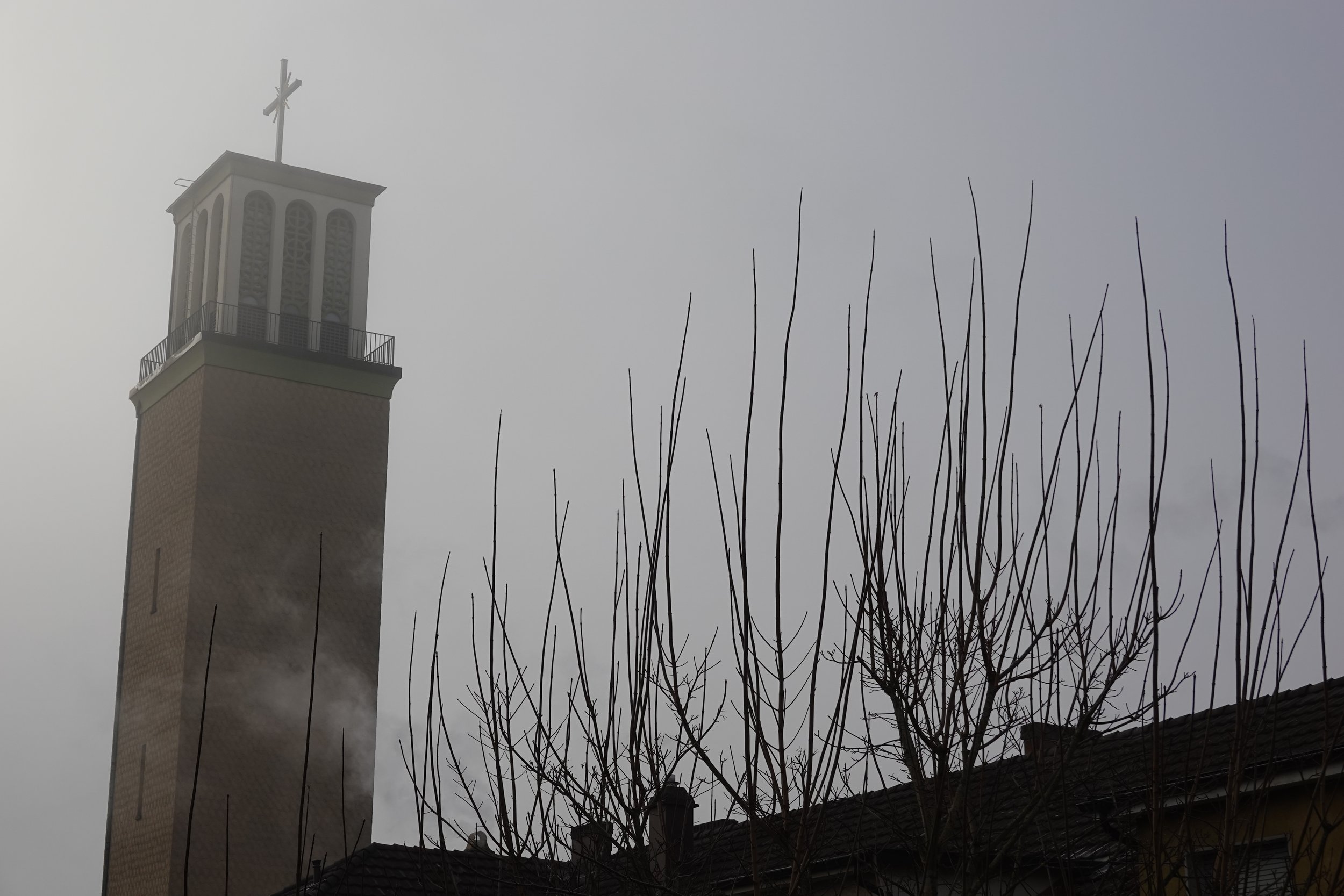
Not What I Expected: Expat Confessions from Switzerland
FLURSTRASSE 33
Up until this point, I’ve only offered a summary of the visible markers of our time in Bern thus far. But I’ve kept most of how I felt about it all to myself. My mood began to change in November, when I started to lose myself in the thick fog that blankets Bern in the fall.
Bern is tucked into the Aare River valley, surrounded by higher ground on all sides. As the days shorten and temperatures drop, cold air sinks and settles in the valley, trapping moisture. Without strong winds or sun to stir the air, temperature inversion occurs, where a layer of warmer air sits above the cooler, moisture-laden air below. This inversion acts like a lid, sealing in the fog.
The result? A persistent, low-hanging mist that can last for weeks. On one hand, magical. Swallowing sound and turning the city into a kind of quiet dreamscape. On the other, disorientingly grey. It felt like living inside a long, slow scene from a film where nothing quite happens, but everything is quietly unraveling. If November and December were the slow unraveling, then January and February were when things truly came undone.
A Miscalculated Transition
I began to see the city through a narrowing lens, colored by one persistent thought:
“I need to get out of here.”
Everything filtered through that one idea, instilling within me a fear of Bern becoming home. Back in the States, I imagined the transition would be smooth. Easy. A piece of cake. After all, I’d spent most of my twenties rather nomadic, working seasonal jobs from town to town, chasing work and adventure. I’d grown used to showing up in a new place, landing a job, making friends. The season would fly by and I’d be off to the next.
I assumed Switzerland would be no different. What i did not account for?
They don't really speak english here.
As I mentioned in my first Schweiz post: Bärndütsch isn’t the easiest thing to pick up. The language barrier proved to be more than a hurdle, it was a wall. A quiet, invisible wall that separated me from almost everyone around me. Of Nicole’s family, only her dad and her sister’s husband spoke enough English for a real conversation. The rest? About where I was with German, smiling and nodding through half-understood moments.
At first, it didn’t faze me, but over time, I started losing the energy and enthusiasm I came here with. I found it harder and harder to sit around the table for dinner, coffee or a cold brewski, unable to join the conversation, for often hours at a time, silently wondering what they’re talking about, yet trying to be a part of it. Laughing when they laugh, scoffing when they scoff, sitting like an obedient dog. We’d be out on a walk, running errands, grabbing a coffee, whatever, when Nicole would bump into someone she knew. Their faces would light up, the Swiss German would start flowing, and I’d just stand there like a dumb mannequin. Smiling. Nodding. Silent.
At first, it felt harmless enough. A little awkward, sure, but manageable. But over time, something started to shift. Those moments stretched longer. My smile grew tighter. The warmth of being included gave way to shame. I wasn’t participating. I wasn’t contributing. I was just, there. A shadow beside her. And slowly, I couldn’t shake imagining what they were thinking while I stood there like a dumb mute:
“Uhh… is he okay?”
“Wow, Nicole, what a catch. Does he talk?”.
And even if they weren’t thinking it, it didn’t matter. I was. And once it did, it played on loop. That voice got louder with every interaction. Every fake laugh. Every polite nod. Every moment I swallowed what I wanted to say because I didn’t have the words to say it. So many things I would’ve said it without hesitation. Here? I just swallowed it. The moment passed. And the next one. And the next.
It wore me down. Made me retreat when I wanted to lean in. I was surprised how heavy the emotional and psychological weight of not being able to participate in daily life felt, it crept into everything. It was isolating.
Made me feel smaller than I’ve felt in years.
The Loss of Voice and Work
Back home I could be a smartass. I could trade shitty banter with an overzealous Trader Joe’s cashier, compliment an old lady’s earrings and ask if her panties matched, or let out a fart at nose level for some toddler. (Okay, I could still do that one here.) But the point is, language gave me presence. It was how I said in a hundred different ways:
“Hello, here I am!”
Now, I couldn’t.
Adding salt to the wound, the language barrier bled into the job hunt. I couldn’t even get an interview for jobs that required little to no work experience, jobs i worked during the summers between university years, lawn mowing, maintenance, factory work. But in the Swiss job market, if you don’t have recent Swiss experience or a local reference, you’re invisible. A degree or any other credentials from abroad, even with glowing qualifications and years of experience, carry less weight than a fart.
What the Swiss market does value are EFZs, Eidgenössisches Fähigkeitszeugnis, (say that five times fast) or a federal vocational certificate. It’s not just some piece of paper here; it’s a golden ticket. The entire Swiss workforce pipeline is built around apprenticeships and formal training that start as early as 15 or 16. By the time someone’s 20, they’ve already got years of specialized, on-the-job experience in whatever field they’re in.
So when a résumé lands on a Swiss desk without that little EFZ stamp, it might as well be scribbled in crayon. Doesn’t matter if you’ve been managing teams or building houses for a decade abroad, if it’s not done the Swiss way, hit the highway. Add in the fact that you don’t speak German and you’re not just underqualified, you’re a risk. And the Swiss don’t fuck with risk, atleast in the germaniac regions. They like boxes checked, certificates stamped and references they can call without dialing international.
The whole thing started to feel less like a job search and more like banging my head against a bureaucratic wall. One night I was watching the local swiss news, they were interviewing a refugee who had been an ER doctor for over 30 years. Here in Switzerland? She’d have to go back to school or get her leg chopped off before seeing an emergency room again.
You could have a guy whose delivered over a million babies in France, but they would rather take a fresh swiss graduate who hasn't sniffed a vagina. This mismatch between ability and recognition is a frustrating and demoralizing barrier to integration and it became impossible not to take each rejection personally.
Yes, It Gets Worse
And if all this is already sounding like a bitch-ass sob story… what comes next will sound even more whiny, but it’s just the truth, the reasons responsible for how i felt.
So before you roll your eyes and write me off as just another big fat weiner, i acknowledge the reasons for my struggle are not noble or grand and stem from my inability to adapt, my resistance to change and how I tried to use old tools to shape my current reality.
So while I may not be handling it gracefully just yet, it’s a process damnit, and it’s processing me without any lube.
Craving Space in a Maze of Neighborhoods
One thing I didn’t expect to miss so much: space.
I’m not talking some city park or small forest where you run into someone every 2 minutes, which Bern has plenty. I’m talking about the wild stuff. The unbothered silence of BLM land, national forests, and federally owned stretches of wilderness in the U.S. that feel nearly endless.
Most of my adult life revolved around outdoor themed seasonal work in destination towns, places where nature wasn't just nearby, it was there, right outside the door. Even in Portland, a semi-big city, where I spent the last three years, there was Forest Park. A massive, 5,000-acre wilderness that starts practically downtown and just keeps going, winding through ravines and up hills, crisscrossed with over 80 miles of trails. You didn’t have to plan, it was woven into the fabric of the everyday. A lunch break. A late afternoon jog.
Here? It was teasing me from the horizon.
The Swiss Alps, famed and majestic, seen on a clear day a jagged line across the southern horizon, visible from throughout the city, but here’s the thing. You have to get there: a train ride, a planned excursion, a day marked off in advance. Places like Grindelwald, Lauterbrunnen, Interlaken, all the names you read about in travel magazines, are well within a two-hour radius. But that access comes at a price. Without a vehicle, a round-trip train ticket to those alpine towns is around 40 francs, (and thats with my half fare travel card). For Nicole and me both? Double that. Jobless and with Lou right around the corner, every franc mattered.
The outdoors have always been more than recreation. They’ve been an outlet, a way to process, a release valve. Not having that same kind of immediate access in Bern was harder than I expected. I felt like I was missing one of the main things I’d come here for.
Even a simple walk felt off. The residential areas make me feel like a mouse in a maze when I step outside for a walk, so clean and tidy i feel i can’t even fart without judgment. Lined with 5 story apartments and buildings that looked more like sterile offices than apartments.
Streets so narrow cars park on the curb, inching onto the already narrow sidewalks, the same sidewalk you’re trying to use to walk off some steam. And around every corner there someone is, and behind you, seems there’s always someone’s footsteps literally echoing off the corridor-like neighborhoods. LIKE JUST PASS ME ALREADY.
And it’s nobody's fault but mine, but It wore on me, because wherever i went, there someone was. It felt like wearing an outfit two sizes too small. For someone used to the spaciousness of American cities, it started to feel claustrophobic, like the buildings were closing in on me.
At first, I thought it was just culture shock, perhaps a yearning for what was familiar. But over time, that shock didn’t subside, it compounded. The tightness of the streets and the constant presence of people started to press in. I started craving space in the way someone might crave sunlight after a long winter.
I missed, like hell, those wide residential neighborhoods back in the States, especially in Portland. Wide streets that allowed for two-way traffic, cars parked on both sides and sidewalks buffered by strips of grass and trees. Streets lined with single-family homes, each one a little different, yards spilling out toward the sidewalk. You could view someone’s house and yard without being a pervert, without breathing down their neck, then continue on your way, walking without inhaling someone else’s exhale.
And yet, none of it is wrong. And i hope that i haven't painted a blurry picture of Bern and if i have, it’s because I failed to shine the light where it really belongs: on my own inability to catch my thoughts before I was already caught in their undertow.
The Identity of Movement
Under it all was another weight, a persistent physical discomfort. My body had been out of sync for months. Physical movement had become a kind of armor for me, part of my identity, something that announced who I was before I even spoke.
But over time, it became less about the exercise itself and more about giving my mind something to hold onto, a distraction from deeper insecurities and questions I didn’t always want to face. Running into pain, sidestepping instead of reflecting, adjusting and altering my approach until those deviations too, ran into another pain. I did it with everything: running, resistance training, yoga. And eventually, I reached a point where there were no more adjustments to make.
When we landed in Switzerland, instead of putting energy into integrating, I fell back into old patterns, leaning on exercise for stability. But again, I pushed too hard. Insomnia. CNS fatigue. Chronic tension. Headaches. My body felt like it was pulling itself apart trying to hold itself together.
So I stopped. I let it all go.
With no movement to occupy my mind, no trails to run, no job, no language and a baby on the way, I found myself completely unmoored.
Alone, Together
And the cherry on top?
I couldn’t even confide in Nicole anymore.
I’d worn her out barking and gnawing at her heels like an annoying little chihuahua with ideas, schemes and what-ifs. But her energy had turned inward. Her world narrowed as her belly expanded. She was deep in the now, preparing to give birth.
Meanwhile, I had no belly. No physical reminder of what was coming.
All I could think about was how we had no plan. No job. No income. No movement. I felt stagnant, like we were standing on a lily pad that couldn’t hold our weight much longer and when it sank, we would have no idea where to go.
We were, just… waiting.
Day after day, week after week. i pestered her about the next step. But Nicole, wouldn’t meet me there, couldn’t meet there and shouldn’t have even had to think about meeting me there. She finally told me, gently but firmly:
“Enough.”
She didn’t have room for hypotheticals, strategies, or far-off dreams. She was in her third trimester and her energy belonged to the present. Which left me feeling very alone, tethered to Bern, a city that to me felt heavy and cold.
It was the perfect storm:
Months of job rejections, language barrier, no friends, no familiar outlets and a baby on the way.
One designed to test not just my patience, but my belief in the path I had chosen, laid over stones of uncertainty, toward a life abroad, starting a bed and breakfast and a family without the slightest clue of what i was doing.
